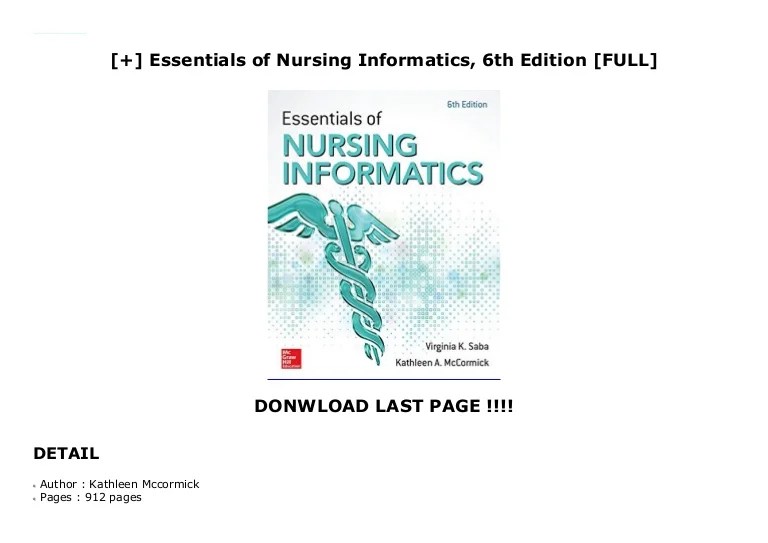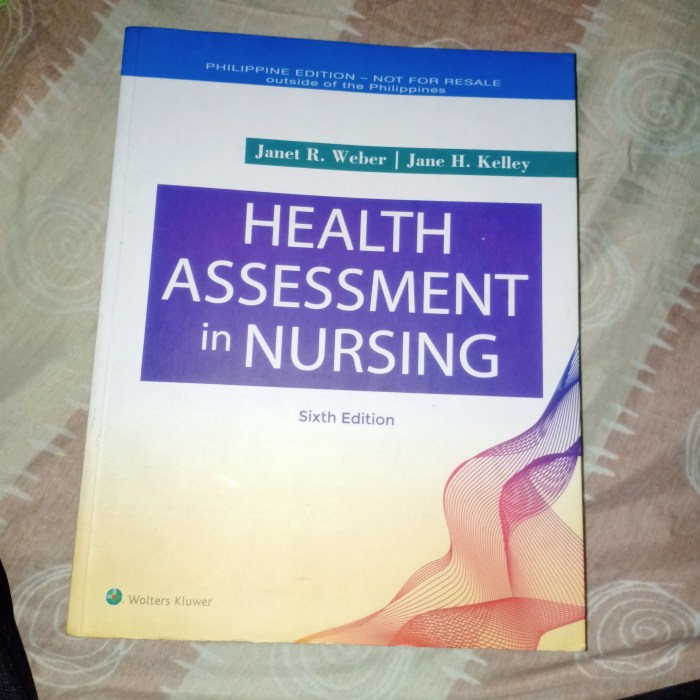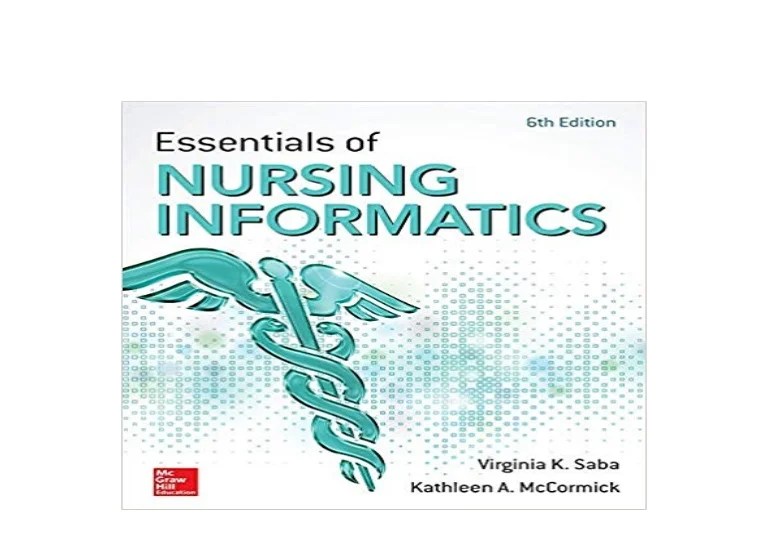Informatics and Nursing 6th Edition presents a comprehensive overview of the rapidly evolving field of nursing informatics, highlighting its crucial role in enhancing patient care and transforming healthcare delivery. This updated edition explores the latest advancements in technology, education, and research, empowering nurses with the knowledge and skills to navigate the ever-changing healthcare landscape.
The text delves into the practical applications of nursing informatics, showcasing how it improves communication, collaboration, and decision-making among healthcare professionals. It also examines the educational pathways available for nurses seeking to specialize in this field and the benefits of obtaining a nursing informatics certification.
Introduction: Informatics And Nursing 6th Edition
Nursing informatics is a field that combines nursing science with information and computer science to manage and communicate data, information, knowledge, and wisdom in nursing practice. It plays a vital role in improving patient outcomes, enhancing healthcare delivery, and advancing the nursing profession.
In today’s healthcare environment, nursing informatics is essential for nurses to effectively manage the vast amount of data generated in patient care. It provides nurses with tools and technologies to access, analyze, and use data to make informed decisions, improve patient safety, and enhance communication among healthcare professionals.
Purpose and Scope of the 6th Edition
The 6th edition of “Informatics and Nursing” aims to provide a comprehensive and up-to-date overview of the field of nursing informatics. It covers the latest trends, technologies, and best practices in nursing informatics, with a focus on their application in real-world nursing practice.
The book is organized into six parts, each covering a specific aspect of nursing informatics:
- Foundations of Nursing Informatics
- Nursing Data and Knowledge Management
- Nursing Decision Support and Clinical Reasoning
- Nursing Communication and Collaboration
- Nursing Leadership and Informatics
- The Future of Nursing Informatics
Each part is further divided into chapters that explore specific topics in detail. The book also includes case studies, exercises, and discussion questions to help readers apply the concepts discussed in the text to their own practice.
Nursing Informatics in Practice

Nursing informatics plays a vital role in improving patient care by leveraging technology and data to enhance nursing practice. It facilitates the efficient management of patient information, streamlines communication, and supports decision-making, leading to improved patient outcomes.
Nursing informatics enables the effective use of electronic health records (EHRs), which provide a comprehensive view of patient data. EHRs facilitate the accurate and timely documentation of patient information, reducing the risk of errors and improving the continuity of care.
They also allow for the integration of data from various sources, such as medical devices and patient portals, providing a holistic view of the patient’s health status.
Enhancing Communication and Collaboration
Nursing informatics enhances communication and collaboration among healthcare professionals by utilizing secure messaging systems and virtual platforms. These tools facilitate the real-time exchange of information, allowing nurses to consult with physicians, specialists, and other members of the healthcare team. Improved communication reduces delays in decision-making and ensures that patients receive timely and coordinated care.
Additionally, nursing informatics supports the development of clinical decision support systems (CDSSs), which provide nurses with evidence-based recommendations and alerts. CDSSs assist nurses in making informed decisions about patient care, reducing the risk of errors and improving patient safety.
Examples of Nursing Informatics in Clinical Practice
- EHRs:Electronic health records provide a comprehensive view of patient data, including medical history, medications, allergies, and laboratory results. This information is accessible to authorized healthcare professionals, improving coordination of care and reducing the risk of errors.
- Telehealth:Telehealth platforms allow nurses to provide remote care to patients in rural or underserved areas. Nurses can conduct virtual consultations, monitor patient progress, and provide support through secure video conferencing.
- Patient portals:Patient portals give patients access to their own health information, including test results, appointment schedules, and medication lists. This empowers patients to take an active role in their care and improves communication with their healthcare providers.
Nursing Informatics Education

Nursing informatics education plays a pivotal role in equipping nurses with the knowledge, skills, and competencies necessary to harness technology and data in improving patient care. It empowers nurses to become effective change agents in the rapidly evolving healthcare landscape.Various
types of nursing informatics education programs are available, ranging from certificate programs to master’s degrees. These programs provide a comprehensive understanding of informatics principles, data management, technology applications, and their impact on nursing practice.
Benefits of Nursing Informatics Certification, Informatics and nursing 6th edition
Obtaining a nursing informatics certification demonstrates a nurse’s commitment to professional development and expertise in the field. It validates their knowledge and skills, enhances their credibility, and opens doors to career advancement opportunities. Certification also ensures that nurses stay abreast of the latest advancements in nursing informatics, enabling them to deliver optimal patient care.
Nursing Informatics Research
Nursing informatics research plays a vital role in advancing the field by generating new knowledge, evaluating existing practices, and informing decision-making. Research in nursing informatics utilizes a range of methods, including qualitative, quantitative, and mixed methods, to investigate various aspects of the field, such as the impact of health information technology on patient outcomes, the development of new nursing interventions, and the evaluation of educational programs.
Types of Nursing Informatics Research Methods
- Qualitative researchinvolves the collection and analysis of non-numerical data, such as interviews, observations, and documents. It is often used to explore complex phenomena, understand experiences, and develop theories.
- Quantitative researchinvolves the collection and analysis of numerical data, such as surveys, experiments, and data mining. It is often used to test hypotheses, evaluate interventions, and measure outcomes.
- Mixed methods researchcombines qualitative and quantitative methods to provide a more comprehensive understanding of a research question.
Examples of Significant Nursing Informatics Research Studies
Numerous nursing informatics research studies have had a significant impact on the field, including:
- The “Nursing Information System for Patient Care” (NISPAC) study, which demonstrated the benefits of using electronic health records (EHRs) to improve patient care and reduce errors.
- The “eICU” study, which showed that using telemedicine to monitor critically ill patients in remote locations could improve outcomes and reduce costs.
- The “Nursing Education Simulation Study” (NESS), which found that using simulation-based education could improve nursing students’ clinical skills and confidence.
Future of Nursing Informatics

Nursing informatics is a rapidly evolving field that is expected to continue to grow in importance in the years to come. As the healthcare system becomes increasingly complex, the need for nurses who are able to use technology to improve patient care will only increase.Nursing
informatics will continue to evolve to meet the needs of the healthcare system in a number of ways. First, nurses will need to become more proficient in using technology to collect, manage, and analyze data. This data can be used to improve patient care, identify trends, and make better decisions.
Second, nurses will need to become more involved in the design and implementation of health information systems. These systems can help to improve the efficiency and effectiveness of patient care. Third, nurses will need to become more involved in research to develop new ways to use technology to improve patient care.There
are a number of challenges that lie ahead for nursing informatics. One challenge is the need to ensure that nurses have the necessary education and training to use technology effectively. Another challenge is the need to develop new technologies that are tailored to the needs of nurses.
Finally, there is the need to address the ethical issues that arise from the use of technology in healthcare.Despite these challenges, the future of nursing informatics is bright. As the healthcare system becomes increasingly complex, the need for nurses who are able to use technology to improve patient care will only increase.
Nursing informatics is a rapidly evolving field that is poised to make a significant contribution to the healthcare system in the years to come.
Challenges and Opportunities
There are a number of challenges and opportunities that lie ahead for nursing informatics.
Challenges
* Ensuring that nurses have the necessary education and training to use technology effectively
- Developing new technologies that are tailored to the needs of nurses
- Addressing the ethical issues that arise from the use of technology in healthcare
Opportunities
* Improving the efficiency and effectiveness of patient care
- Identifying trends and making better decisions
- Developing new ways to use technology to improve patient care
FAQ Summary
What are the benefits of using nursing informatics in healthcare?
Nursing informatics improves patient care by enhancing communication, collaboration, and decision-making among healthcare professionals.
What are the different types of nursing informatics education programs available?
Nursing informatics education programs range from certificate programs to doctoral degrees, providing nurses with varying levels of knowledge and skills in this field.
What is the role of nursing informatics research in advancing the field?
Nursing informatics research contributes to the development of new technologies, best practices, and educational strategies that enhance patient care and advance the profession.